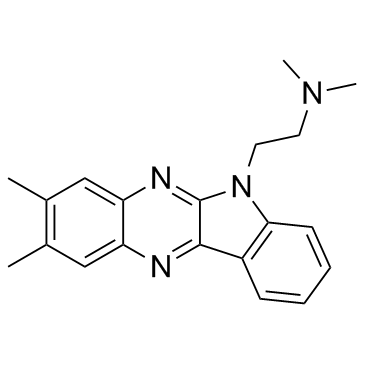| Description |
B220 is an antiviral agent which can inhibit the growth of HSV-1, HSV-2 and human cytomegalovirus (CMV).
|
| Related Catalog |
|
| Target |
HSV-1
HSV-2
|
| In Vitro |
B220 is an antiviral agent which can inhibit the growth of HSV-1, HSV-2 and human cytomegalovirus (CMV)[1]. B220 inhibits neutrophil release of reactive oxygen species, as well as intracellular generation of reactive oxygen species. The inhibition is not achieved through direct oxygen radical scavenger activity of B220, and B220 has no immediate effects on the activity of the assembled oxidase. The neutrophil capability to phagocytose fluorescein-labeled opsonized yeast cells is reduced by B220. Cells preincubated with B220 (10 µg/mL) and then stimulated with the formylated peptide fMLP mobilize fewer C3 receptors on their surface than the control cells[2].
|
| Cell Assay |
Cells preincubated with or without B220 are stimulated with N-formylmethionyl-leucyl-phenylalanine (fMLP) for 5 min and then fixed in paraformaldehyde [4% w/v in phosphate-buffered saline (PBS); 30 min on melting ice]. For detection of CR3, 10 µL of conjugated mAb is added to a cell pellet (approximately 100 µL) of 106 cells. The mixture is incubated for 30 min on ice and then washed twice with PBS. The amount of antibody bound is examined by flow cytometry. The release of vitamin B12-binding protein is assayed after activation of the cells with fMLP for 5 min using the cyanocobalamin technique[2].
|
| References |
[1]. Mohammed Homman, et al. Pharmaceutical formulation of B220 for topical treatment of herpes. EP 2489354 A1. [2]. Harbecke O, et al. The synthetic non-toxic drug 2,3-dimethyl-6(2-dimethylaminoethyl)-6H-indolo-(2,3-b)quinoxaline inhibits neutrophil production of reactive oxygen species. J Leukoc Biol. 1999 Jun;65(6):771-7.
|
